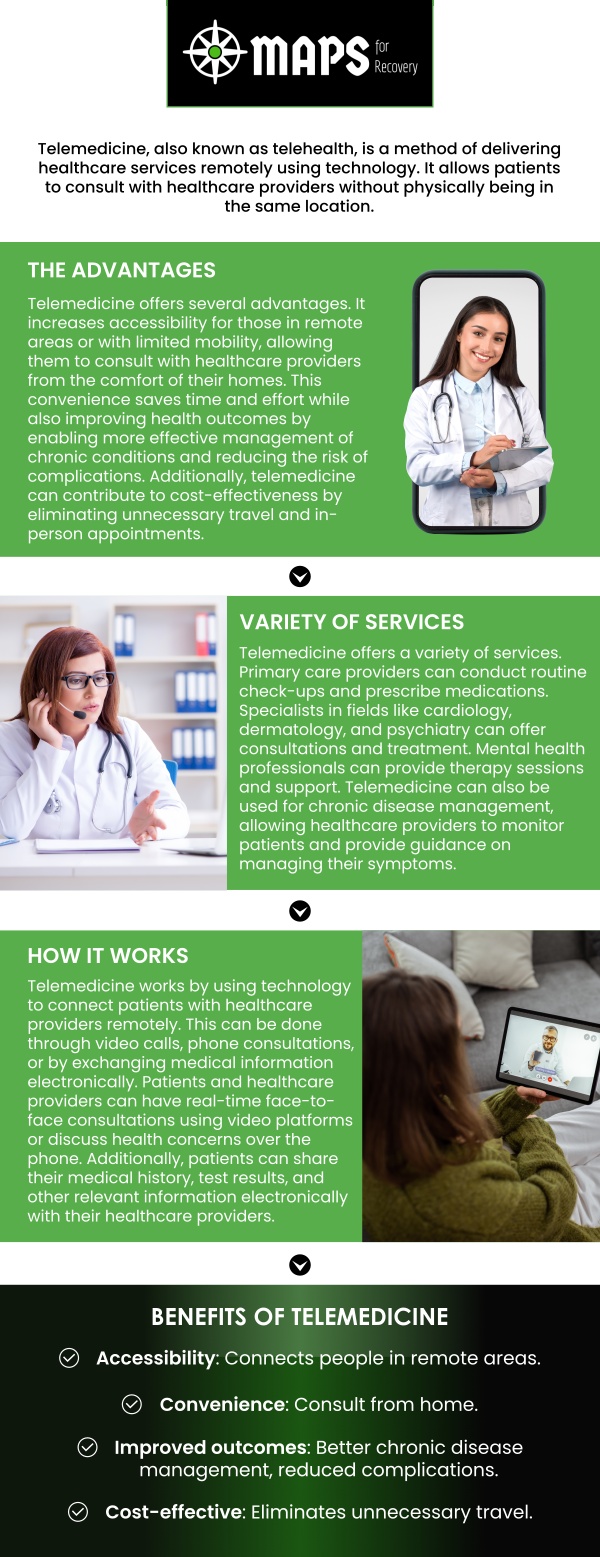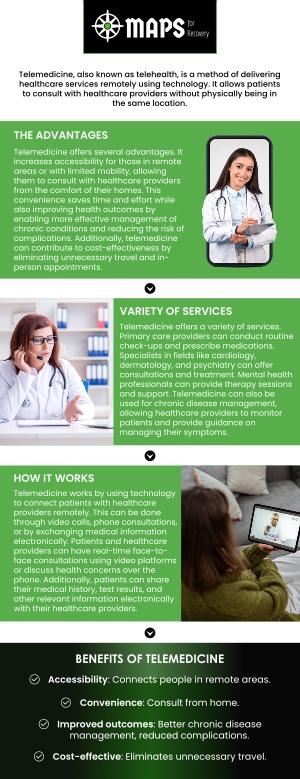Telehealth Addiction Treatment in Austin, TX
Helping patients overcome withdrawal symptoms, deal with cravings, and stop using drugs or alcohol are the main objectives of addiction treatment. One of the main advantages for people using telehealth for addiction treatment is how convenient it is to receive therapy over the phone or internet. At MAPS for Recovery, Lynn E. Lytton, MD offers telehealth options to treat individuals with addiction. For more information, contact us today or schedule an appointment online. We serve patients from Austin TX and surrounding areas.




Table of Contents:
What is the meaning of telehealth?
Can I get addiction treatment through telehealth?
Why use telehealth?
What are the benefits of telehealth for addiction treatment?
How can Lynn E. Lytton, MD, at MAPS for Recovery provide telehealth addiction treatment in Austin, TX?
Telehealth is a broad term that involves the delivery of health care, health information, and health education through digital technology platforms. This method of care involves tools like video conferencing, mobile apps, and the internet to provide remote patient support and health care remotely.
Telehealth is particularly valuable for its ability to make healthcare services more accessible and convenient, particularly for individuals who might be geographically isolated or have limitations that make in-person visits challenging. By using telehealth, medical professionals can offer timely and effective care to those who otherwise may be unable to access it.
Telehealth eliminates concerns of distance between patients and providers, enhancing access to medical care and information. It makes keeping health appointments more affordable by avoiding the need for transportation and limits the time commitment associated with ongoing care making it an ideal choice for busy individuals.
Telehealth is capable of replicating many in-person services from diagnosis through to treatment. Telehealth includes a range of services such as remote clinical services, patient and professional health-related education, public health, and health administration. Technologies used include both synchronous methods and asynchronous methods in some cases.
Addiction treatment can be effectively managed through telehealth platforms, with many of the services being equally as effective as those available in person. Telehealth services allow healthcare providers to conduct assessments, offer counseling, and prescribe necessary medications, all remotely.
This mode of delivery is particularly beneficial for individuals facing barriers to accessing traditional in-person treatment, such as geographical constraints or a lack of local healthcare resources which may be particularly relevant for those dealing with addictions.
Through telehealth, patients can maintain regular contact with their treatment providers, which is essential for successful addiction management. Addiction is characterized by the ongoing use of substances such as drugs or alcohol or engagement in negative behaviors despite adverse consequences.
It is increasingly recognized as a complex health condition that affects the brain and behavior. Providers at MAPS for Recovery will work with each patient to tailor specific treatment plans to individual needs.
Telehealth is used for its ability to overcome traditional barriers to healthcare access such as geographic distance, mobility limitations, and time constraints. Particularly in mental health and addiction services, telehealth is valuable in facilitating ongoing support and care.
The convenience of accessing care from home or a preferred location can make a significant difference in patient engagement and the continuity of care. This is especially important in addiction treatment, where regular check-ins and sustained treatment interventions can significantly impact recovery outcomes.
Telehealth can also be a more cost-effective way of delivering care. It reduces the need for travel and the associated costs, not just for patients but also for healthcare systems. For patients, it means accessing care can be less disruptive to their daily lives, and they can engage in appointments from the comforts of their own homes or other familiar settings.
Telehealth provides several advantages in the treatment of addiction. Ignoring or delaying addiction treatment poses severe risks to an individual’s physical and mental health, potentially leading to a wide range of adverse consequences such as health risks, deteriorating relationships, and a decreased overall quality of life.
In the absence of treatment, addiction can become progressively worse, leading to more severe complications over time. Telehealth services provide easier access to care, ensuring that more people can receive timely and effective treatment interventions, regardless of their location or situation.
It allows for greater flexibility in scheduling and more frequent contact between patients and healthcare providers, which can enhance the management of addiction. The use of telehealth supports the implementation of comprehensive treatment plans that include both medications and therapies as needed. Patients are also able to receive timely interventions and support in a setting they find secure and comfortable, which can enhance the effectiveness of the treatment.
Lynn E. Lytton, MD, at MAPS for Recovery, offers telehealth addiction treatment to provide accessible, convenient care for individuals seeking recovery from addiction. Telehealth services allow patients to receive professional care from the comfort of their homes, making it easier for those with busy schedules or transportation challenges to access treatment. Dr. Lytton offers personalized telehealth sessions that include therapy, counseling, and medication-assisted treatment, ensuring that individuals receive the same quality of care as they would in an in-person setting.
Telehealth addiction treatment is a great option for those looking for flexibility in their recovery process. Dr. Lytton uses evidence-based practices to guide patients through their recovery journey, addressing both the physical and emotional aspects of addiction. Whether you’re dealing with alcohol, opioid, or other substance use disorders, telehealth sessions can provide ongoing support and help you stay on track with your recovery goals.
With telehealth services, Dr. Lytton ensures that patients are closely monitored, with regular check-ins and adjustments to treatment plans when necessary. For more information, contact us today or schedule an appointment online. We serve patients from Austin TX, Georgetown TX, Leander TX, Jonestown TX, Cedar Park TX, Round Rock TX, Rollingwood, TX, Bluff Springs TX, Del Valle TX, and surrounding areas.
Check Out Our 5 Star Reviews


ADDITIONAL SERVICES YOU MAY NEED
- Addiction Treatment
- Alcohol Dependence Treatment
- Benzodiazepine Treatment
- Chronic Pain Treatment
- Drug Treatment
- EMDR Therapy
- Heroin Addiction Treatment
- Medical Management of Alcohol Addiction
- Medical Management of Benzodiazepine
- Medical Management of Opiate Addiction
- Opioid Dependence Treatment
- Tobacco Cessation Treatment
- Transitioning off Xanax

ADDITIONAL SERVICES YOU MAY NEED
- Addiction Treatment
- Alcohol Dependence Treatment
- Benzodiazepine Treatment
- Chronic Pain Treatment
- Drug Treatment
- EMDR Therapy
- Heroin Addiction Treatment
- Medical Management of Alcohol Addiction
- Medical Management of Benzodiazepine
- Medical Management of Opiate Addiction
- Opioid Dependence Treatment
- Tobacco Cessation Treatment
- Transitioning off Xanax




